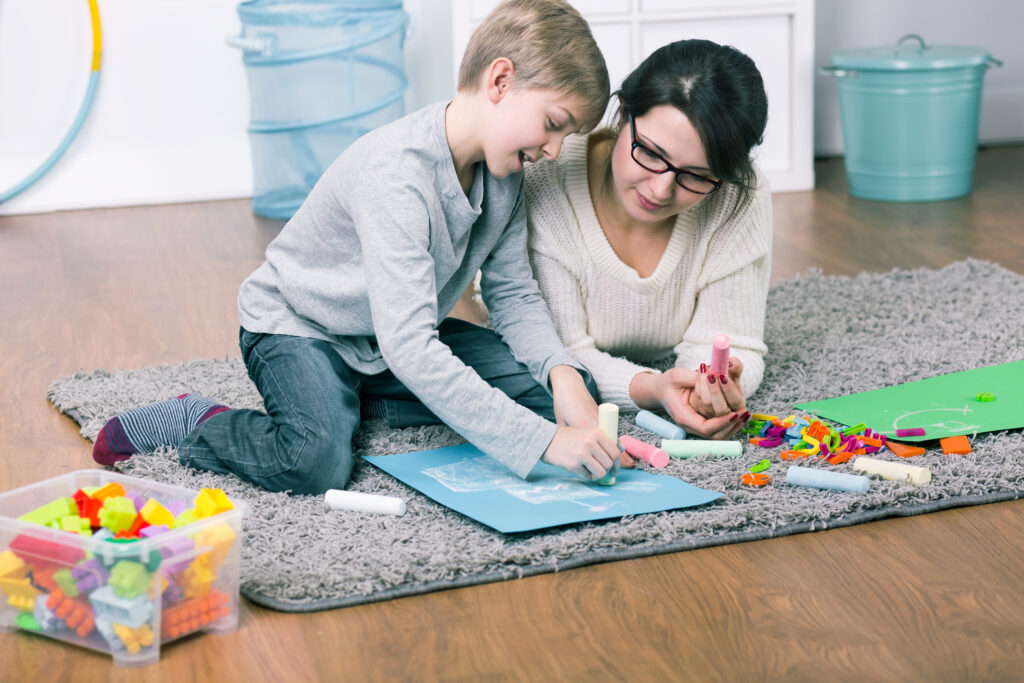When it comes to helping children process their emotions, traditional talk therapy isn’t the best approach. Children’s brains, language skills, and emotional maturity are still developing, which means traditional talk therapy often doesn’t work with them. This is where play therapy comes in as an effective tool for communicating with kids. By using the universal language of play, therapists can connect with children on their level, helping them work through challenges, develop coping mechanisms, and make sense of what’s going on in their worlds.
What Is Play Therapy?
Play therapy is a form of psychotherapy that allows kids to express their feelings, thoughts, and experiences using toys, games, art supplies, and role-playing scenarios rather than simply verbalizing their experiences. Play therapists observe a child’s behavior, choices, and interactions during play to gain valuable insight into the emotional or psychological challenges the child may be experiencing. This therapeutic approach is especially effective for children aged 3 to 12, though it can also be adapted for adolescents who struggle to articulate their emotions verbally.
Why Play Therapy Is The Best Approach For Children?
Children Communicate Differently Than Adults
While most adults can explain their thoughts and feelings with words, kids often lack the vocabulary or insight to do the same. For example, a child experiencing anxiety might not say, “I’m feeling worried about school.” Instead, using art, toys, or games may help them express this feeling. Talk therapy requires a level of verbal expression and self-awareness that many children haven’t developed yet.
Fear Or Reluctance To Share
Being in an unfamiliar environment with a stranger, and having challenging or personal questions asked can be intimidating for any child. They might not feel comfortable or safe enough to openly share their thoughts in a traditional talk therapy session. Play therapy eliminates this barrier by allowing children to engage in something they inherently enjoy and feel comfortable doing—playing. It also allows them to safely project their thoughts and feelings onto the toys in the room, such as sharing through puppets, sandtray miniatures, and other toys.

What Are The Benefits Of Play Therapy?
Connecting With Children Through Play
Play is a natural form of communication for children. Play is their language, and the toys are their words (Gary Landreth). They use play to explore their environment, practice emotional regulation, and make sense of their experiences. If a child feels powerless or afraid, they might express this through a story that shows them as the superhero who saves the day. They may not know how to say how they’re feeling, but they can communicate this to a therapist through play, helping the therapist understand the emotions they’re feeling and their experiences through the themes displayed in their play.
Building Trust & Rapport
Play helps children feel more at ease and gives them a sense of trust and safety. This foundation is important for play therapy to be effective because it encourages children to share their thoughts and emotions without feeling judged or threatened.
Developing Critical Skills
Play therapy isn’t just about expressing emotions, but also helping children develop essential life skills such as:
- Problem-solving⎯Working through challenges using imaginative play.
- Empathy⎯Acting out scenarios that help them understand different perspectives.
- Coping techniques⎯Learning how to manage stress through storytelling or role-playing.
These skills often translate into better emotional regulation and social functioning outside therapy. Other common goals in play therapy include children increasing use of effective social skills, increasing self-esteem, reducing anxious thoughts and feelings or depressive symptoms, and increasing impulse control skills while reducing impulsive behaviors.
How Play Therapy Works
Play therapy can be structured or unstructured, depending on the play therapy theory the therapist is using with the child. Just as therapy with adults has differing theories, this is the case in play therapy as well. It’s also flexible depending on the child’s situation, needs, and treatment plan goals. The Play Therapist at East Cobb Relationship Center uses Adlerian Play Therapy, a type of therapy which uses both unstructured and structured play, depending on the needs of the child and where the child is in the process of treatment. The child’s interests and preferences are also brought into play to help with engagement and building on strengths.
Regardless of the stage of treatment, the Therapist is helping the child by reflecting their feelings in session, working with them on learning and practicing coping skills, and using communication skills to help the child develop insight into their own feelings and behaviors. The Therapist helps the client through the use of toys to work through, process, understand, and overcome their struggles. This can look like a child learning social skills through puppets making friends, learning and practicing new coping skills while playing a game, expressing their fears through arts and crafts, or building confidence and exploring their world while building a sandtray theme.
During each session, the Therapist is also setting limits with the child, such as limits in how they treat the items in the room and in the relationship with the therapist. Clients who have experienced abuse will often work through and process their abuse through their use of the toys, helping them to heal as they gain mastery over their experiences, and learning and practicing new coping skills. With this practice in therapy sessions, children of all backgrounds begin to implement these things they are learning outside of session as well.
If you’d like to learn more about play therapy and how we’ll tailor our approach to your child’s individual needs, contact us for a free consultation.
